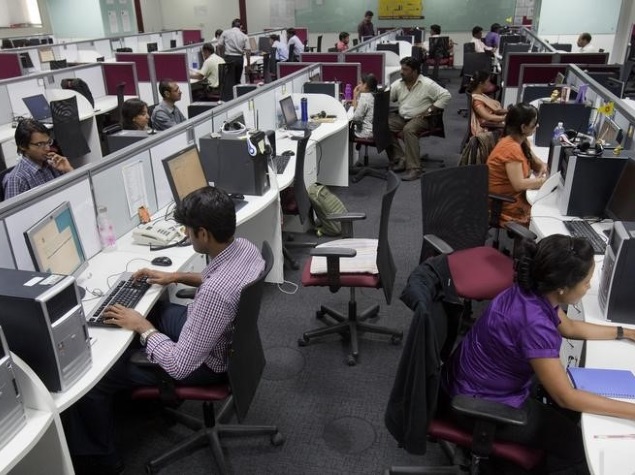- Home
- Mobiles
- Mobiles Features
- Budget 2015: What the Tech Companies Want From the Government
Budget 2015: What the Tech Companies Want From the Government

Finance Minister Arun Jaitley will be announcing the Union Budget 2015-16 on Saturday, and after last year's Budget, the technology companies' expectations are high from the government.
Many of the companies offered general suggestions such as the development of infrastructure and more use of IT in government. Government involvement to raise IT spending is something that companies like AMD and Microsoft appear to be counting on for the coming year.
"Over the past nine months, the Government has set the right context and articulated its vision for India's economic development," said Bhaskar Pramanik, Chairman, Microsoft India. "Programs such as Digital India, smart cities and Skill India require the creation of technological infrastructure that will need Budgetary support. A policy framework for industry and SMEs in particular that encourages innovation and adoption of technology can boost the Make in India initiative. We hope this year's Budget will create an enabling environment for Indian industry to realize its growth potential."
"In the interim Budget last year, the government pledged to support the growth of domestic information technology capabilities in both hardware and software," said Ravi Swaminathan, Managing Director, AMD India and Corporate Vice President, AMD South Asia. "This year we expect the Budget to be aggressive, focusing on making India emerge in the top three hardware countries in terms of demand. Talking about the industry at a whole, we believe affordable broadband, radical government process re-engineering and the use of IT in all government processes will be the biggest enablers."
"We expect PM Modi government's first complete Union Budget to outline the policy and regulatory framework to aid business sentiments and bolster growth," says Kenny Ye, Managing Director UCWeb India. "We have high expectations in terms of attention and budget allocation for the IT sector. We hope the new government is able to provide adequate thrust to investments in IT and its infrastructure. Digital literacy and mobile internet penetration are other areas onto which we would like to see the Finance Minister's focus. The budget should allocate substantial funds to develop a robust network infrastructure and realise the government's 'Digital India' mission that will positively impact the nation."
Tax breaks and entry barriers for phone companies
Mobile handset makers like Micromax and Karbonn have sought tax holidays and subsidies in the upcoming Budget to promote local manufacturing, a move they expect will create lakhs of jobs.
(Also see: Micromax, Karbonn Seeking Tax Breaks to Boost Domestic Manufacturing)
"I hope the government will adopt a carrot rather than a stick approach for India's burgeoning smart devices market through encouraging and supportive rules and regulations to expedite the eco-system creation in India which is quintessential for smart device manufacturing," said Sanjay Kapoor, Chairman, Micromax.
"In Budget 2015, the government should be introducing friendly policies including tax holidays and interest subsidies to give a push to domestic handset manufacturing and increase the mobile phone user base in India," said Pradeep Jain, Managing Director, Karbonn.
In order to boost the sector the government should refund 100% of import duties for all exports made by Indian companies.
"We believe reduction of import duties with an option to allow businesses to Make in India will be a welcome move," said Y Guru, Chairman and Managing Director, Celkon. "This will give a huge boost to the Make in India initiative and also enable Indian businesses to exponentially grow. Reducing Corporate Income Tax to 20 percent linked to investments being made to enhance growth is another aspect the government should be consider."
Companies are also hoping that the Budget will help them to build a price advantage over the increasing international competition from brands like Xiaomi and OnePlus. Maxx Mobile Chairman and Managing Director Ajay Agarwal hoped that custom duty on imports for mobile handsets will be increased. "We also hope that the government will offer ESOPS, subsidies on investments and incentives for Indian mobile manufacturers," he said.
"The budget will play a very critical role in shaping the future growth of mobile handset industry in India," added Ritesh Suneja, Chief Financial Officer, Lava International. "Industry players should get incentives and taxation reforms such as a ten year tax holiday, interest free loans, exemption of special duties on mobiles accessories and parts, and components for post sales warranty repair."
Giving startups a faster start
"One area that is important is the definition of a startup," said Sangeeeta Gupta, VP Nasscom in a prior interview. "This is something that needs clarity." This is important because in the 2014 Budget, Finance Minister Arun Jaitley announced large allocations for the startup sector. You have to be a startup to qualify for these funds or other benefits like soft loans, but without clear definitions, access to these benefits can be a challenge for companies.
Nasscom has a number of recommendations that would help the technology industry to grow. For instance, the industry body is suggesting a lowering in royalties and fees on technical services, and the adoption of international practices on foreign tax credit policies to increase competitiveness.
It also wants information technology and software products to be eligible for research and development deductions in taxes, as should the re-education of employees, which is necessary to maintain competitiveness.
(Also see: Indian Tech Firms Seek Clarity on GST, Taxes at Budget)
Gupta also said that aside from addressing issues, the industry also needs an incentive structure to be created to help growth.
"We need to make patents simpler, and offer schemes and incentives that encourage startups to take risks if we are to grow," Gupta concludes. "From the IT Industry perspective the long elusive transfer pricing clarity is one serious expectation," said Ramesh Loganathan, President Hyderabad Software Enterprises Association. For the Startup ecosystem, clarity in operationalising the Rs. 10,000 Crore startup fund will be great. More specific policy support that incentivize and support incubators will be a major boost to early stage ecosystem."
"From the IT Industry perspective the long elusive transfer pricing clarity is one serious expectation from this Budget," said Ramesh Loganathan, President Hyderabad Software Enterprises Association. For the Startup ecosystem, clarity in operationalising the Rs. 10,000 Crore startup fund will be great. More specific policy support that incentivize and support incubators will be a major boost to early stage ecosystem."
Building up the ecosystem
Bodies such as the Consumer Electronics and Appliances Manufacturers Association (CEAMA) and the Manufacturer's Association for Information and Technology (MAIT) talked about the importance of measures such as implementing a uniform goods and services tax, to reduce paperwork for businesses by applying all taxes at a single point. Reduction of customs duties and special additional duties will also encourage businesses to invest in India, these bodies said.
"It is crucial that reforms like GST be implemented," said Manish Sharma, President CEAMA. "Once fully implemented, GST will create a single, unified Indian market and will diminish the multiple layers of indirect taxation that prevails in India at present."
Anwar Shirpurwala, Executive Director MAIT, however clarified that these moves will not immediately impact consumers, and will instead help by creating more investment, and seeing more growth in the sector.
"These suggestions will help domestic manufacturers to get into the market," he said. "Domestic as well as foreign players are interested in setting up manufacturing in India, and this will benefit the consumers in the long term."
Catch the latest from the Consumer Electronics Show on Gadgets 360, at our CES 2026 hub.
- Samsung Galaxy Unpacked 2025
- ChatGPT
- Redmi Note 14 Pro+
- iPhone 16
- Apple Vision Pro
- Oneplus 12
- OnePlus Nord CE 3 Lite 5G
- iPhone 13
- Xiaomi 14 Pro
- Oppo Find N3
- Tecno Spark Go (2023)
- Realme V30
- Best Phones Under 25000
- Samsung Galaxy S24 Series
- Cryptocurrency
- iQoo 12
- Samsung Galaxy S24 Ultra
- Giottus
- Samsung Galaxy Z Flip 5
- Apple 'Scary Fast'
- Housefull 5
- GoPro Hero 12 Black Review
- Invincible Season 2
- JioGlass
- HD Ready TV
- Laptop Under 50000
- Smartwatch Under 10000
- Latest Mobile Phones
- Compare Phones
- Red Magic 11 Air
- Honor Magic 8 RSR Porsche Design
- Honor Magic 8 Pro Air
- Infinix Note Edge
- Lava Blaze Duo 3
- Tecno Spark Go 3
- iQOO Z11 Turbo
- OPPO A6c
- Lenovo Yoga Slim 7x (2025)
- Lenovo Yoga Slim 7a
- Lenovo Idea Tab Plus
- Realme Pad 3
- Moto Watch
- Garmin Quatix 8 Pro
- Haier H5E Series
- Acerpure Nitro Z Series 100-inch QLED TV
- Asus ROG Ally
- Nintendo Switch Lite
- Haier 1.6 Ton 5 Star Inverter Split AC (HSU19G-MZAID5BN-INV)
- Haier 1.6 Ton 5 Star Inverter Split AC (HSU19G-MZAIM5BN-INV)


![[Sponsored] Haier C90 OLED TV | Dolby Vision IQ, 144Hz OLED and Google TV in Action](https://www.gadgets360.com/static/mobile/images/spacer.png)









